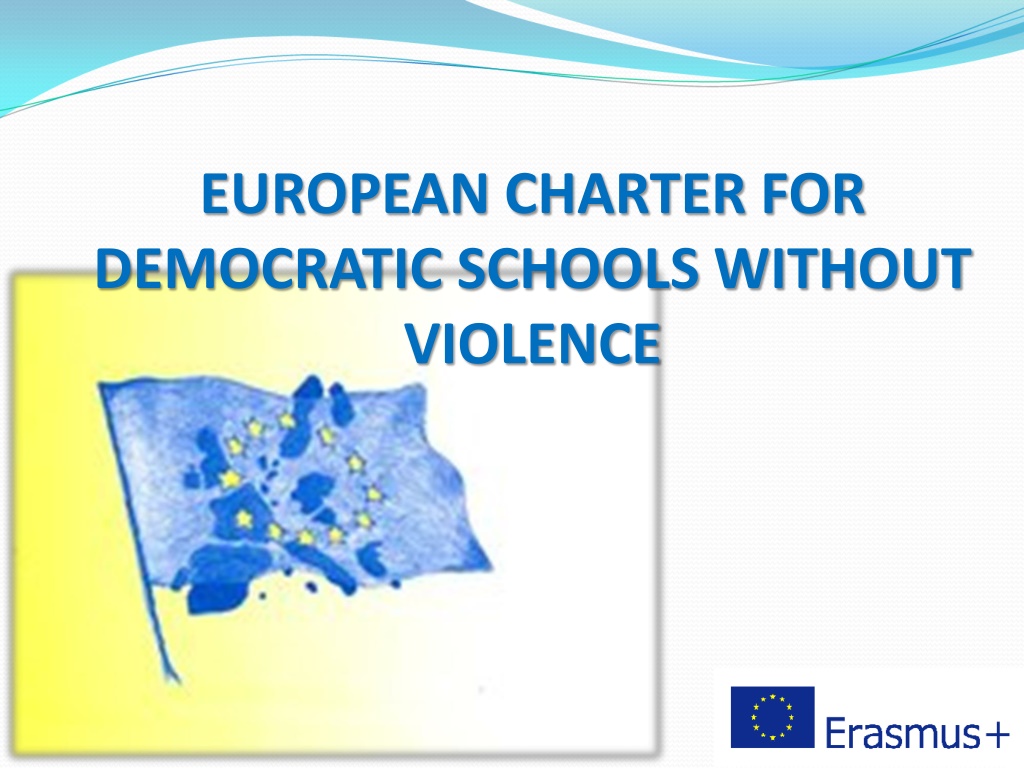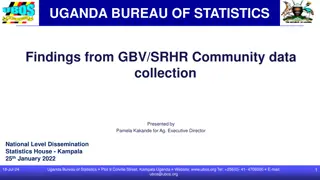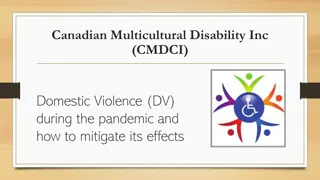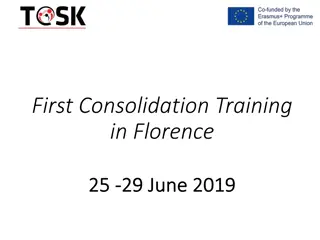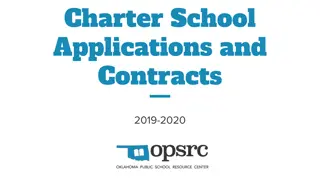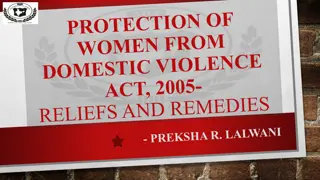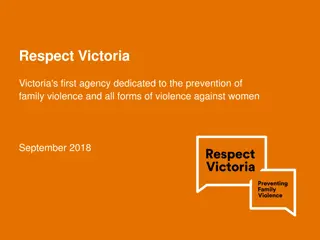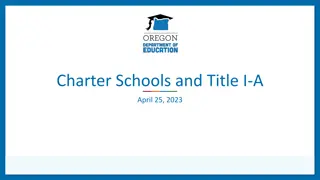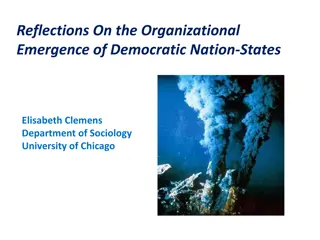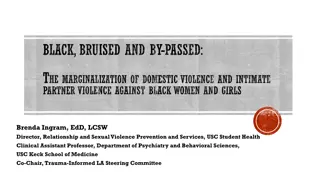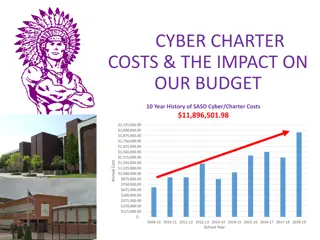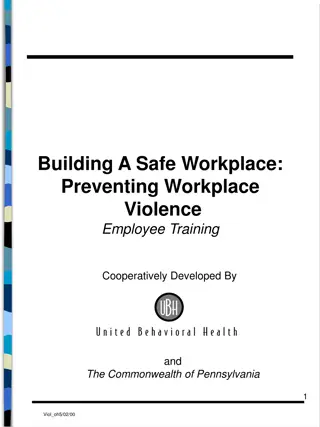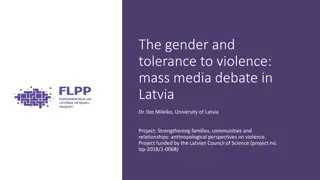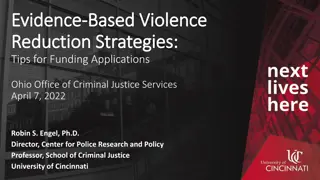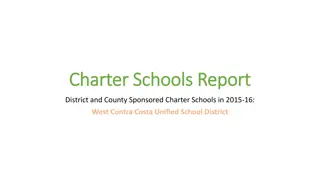European Charter for Democratic Schools Without Violence
The European Charter for Democratic Schools Without Violence emphasizes creating safe and peaceful environments in schools, ensuring equal treatment and respect for all individuals. It highlights the protection of children's rights against violence as mandated by the European Social Charter, including regulations for minimum age of employment, working hours, fair wages, and special protections for young workers.
Uploaded on Sep 30, 2024 | 0 Views
Download Presentation

Please find below an Image/Link to download the presentation.
The content on the website is provided AS IS for your information and personal use only. It may not be sold, licensed, or shared on other websites without obtaining consent from the author.If you encounter any issues during the download, it is possible that the publisher has removed the file from their server.
You are allowed to download the files provided on this website for personal or commercial use, subject to the condition that they are used lawfully. All files are the property of their respective owners.
The content on the website is provided AS IS for your information and personal use only. It may not be sold, licensed, or shared on other websites without obtaining consent from the author.
E N D
Presentation Transcript
EUROPEAN CHARTER FOR DEMOCRATIC SCHOOLS WITHOUT VIOLENCE
Created by Palanga Senoji Gimnazija students class II: Gintar Jasi nait Aist Putri t Gabija Juozapaityt Emilija Liutikait Adomas Janu as Dovydas emaitaitis Mentor: Palanga Senoji Gimnazija librarian Aurelija Jazbutien April 2018
STRASBOURG, 16 JULY 2004 All members of the school community have the right to a safe and peaceful school. Everybody has the responsibility to contribute to creating a positive and inspiring environment for learning and personal developement. Everybody has the right to equal treatment and respect regadless of any personal difference
The European Social Charter regulates protection of the rights of children against violence. This document was ratified by Lithuania in 1997 and since then the provisions of the European Social Charter have been implemented/adopted by the Lithuanian law system. Article 17 - the right of children and young persons to social, legal and economic protection. The Parties that have signed the European Social Charter undertake either directly or in co-operation with public and private organizations to protect children and young persons against negligence, violence or exploitation.
EUROPEAN SOCIAL CHARTER Article 7 The right of children and young persons to protection With a view to ensuring the effective exercise of the right of children and young persons to protection, the Parties undertake: 1 to provide that the minimum age of admission to employment shall be 15 years, subject to exceptions for children employed in prescribed light work without harm to their health, morals or education; 2 to provide that the minimum age of admission to employment shall be 18 years with respect to prescribed occupations regarded as dangerous or unhealthy; 3 to provide that persons who are still subject to compulsory education shall not be employed in such work as would deprive them of the full benefit of their education; 4 to provide that the working hours of persons under 18 years of age shall be limited in accordance with the needs of their development, and particularly with their need for vocational training; 5 to recognise the right of young workers and apprentices to a fair wage or other appropriate allowances; 6 to provide that the time spent by young persons in vocational training during the normal working hours with the consent of the employer shall be treated as forming part of the working Day; to provide that employed persons of under 18 years of age shall be entitled to a minimum of four weeks' annual holiday with pay; 8 to provide that persons under 18 years of age shall not be employed in night work with the exception of certain occupations provided for by national laws or regulations; 9 to provide that persons under 18 years of age employed in occupations prescribed by national laws or regulations shall be subject to regular medical control; 10 to ensure special protection against physical and moral dangers to which children and young persons are exposed, and particularly against those resulting directly or indirectly from their work.
EUROPEAN SOCIAL CHARTER Article 17 The right of children and young persons to social, legal and economic protection With a view to ensuring the effective exercise of the right of children and young persons to grow up in an environment which encourages the full development of their personality and of their physical and mental capacities, the Parties undertake, either directly or in co-operation with public and private organisations, to take all appropriate and necessary measures designed: 1 (a) to ensure that children and young persons, taking account of the rights and duties of their parents, have the care, the assistance, the education and the training they need, in particular by providing for the establishment or maintenance of institutions and services sufficient and adequate for this purpose; (b) to protect children and young persons against negligence, violence or exploitation; (c) to provide protection and special aid from the state for children and young persons temporarily or definitively deprived of their family's support; 2 to provide to children and young persons a free primary and secondary education as well as to encourage regular attendance at schools.
IN LITHUANIA CHILDERENS RIGHTS AGAINST VIOLENCE ARE ENSURED BY: * Constitution of LR * Criminal Code of LR * Civic Code of LR * The Fundamentals of the Protection of the Rights of the Child of LR
On March 22 2017 the Minister of Education of LR approved the law Recommendations on the implementation of violence schools . prevention in The goal of the prevention is to create a safe, friendly environment for a pupil's personality growth, maturity in a school where pupils feel respected, accepted, safe, their opinions and suggestions are listened to and appreciated.
PREVENTION PROGRAMMES RECCOMMENDED TO SCHOOLS BY LR: Protect and respect me" - a program for the prevention of sexual abuse of children and children s sexual exploitation. Peaceful school programme to prevent conflicts. Lions Quest Key to success developing social and emotional competence in grades 9-12. Olweus programme to prevent bullying (grades 5-10) programme to develop a child s expression control (VEIK) developing social and emotional competences (8-18 years of age) Sniego gni t prevention of using psycemonic substances (grades 9-12) On your path - prevention of using psychoactive substances (grades 9-12) 21 prevention programmes are recommended. 4 mln. Euros will be assigned to implement these programmes.
IMPLEMENTING PREVENTION MEASURES AGAINST VIOLENCE IN PALANGA SENOJI GIMNAZIJA
A Childs Welfare Commission takes care of creating safe and friendly environment for students in Palanga Senoji Gimnazija. Vaizdo rezultatas pagal u klaus Pagalba vaikui
COURSE OF ACTION IN INCIDENTS OF VIOLENCE 10 steps if a violent crime occurs in Senoji Gimnazija: 1. Clarifying the crime. 2. Giving aid to the victim. 3. Providing the victim with the skills in order to prevent violence in future. 4. Children who have witnessed violence are taught rules of behaviour in such situations. 5. Giving adequate punishment to the wrongdoer. 6. Giving the wrongdoer the needed aid. 7. Teaching adults. 8. Evaluating and changing the circumstances under which the incident of violence occurred. 9. Observing the relapse. 10. Predicting potential signs and causes of incidents of violence.
CREATING SAFE ENVIRONMENT IN SENOJI GIMNAZIJA
VIRTUES AND DOCUMENTS REGULATING THE MANNER OF CONDUCT IN GIMNAZIJA The Statute of Gimnazija; The Code of Ethics of Gimnazija s comminity; The student s Code of Honour; The student s rules of conduct; An Agreement of students;
CIVIC ACTIVITIES Project of Palanga Municipality Touch History to mark 100th anniversary of the State of Lithuania
CIVIC ACTIVITIES Festive run to mark March 11th Walk Amber Road to mark making Palanga part of Lthuania Quiz to mark Independence Day, February 16 Civic campaign Bloom, Lithuania to mark March 11
ACTIVITIES OF TOLERANCE EDUCATION CENTRE Civic initiative Remembrance Road to mark Lithuanian Jewish Genocide Victims Day Civic initiative Angel of Hope to mark the Day of Freedom Defenders Expedition along the roads of Kardas (Sword) partizans Civic initiative WE REMEMBER to remeber the victims of the Holocaust
SOCIAL ACTIVITIES Christmas charity fair
SOCIAL ACTIVITIES Project Save the children Cleaning the Jewish cemetry in Palanga Volunteering in a care home Environmental campaign Let s Do it
MUNICIPALITY FUNDED PREVENTION AND CREATIVITY PROJECTS Motorized and not dangerous Students poetry autumn in Palanga Feast of alternative fashion BANGA (Wave) Performances of the drama studio Kuprin (Backpack)
MEETINGS WITH POLICEMEN AND ARMY OFFICERS
EVENTS OF STUDENTS PARLIAMENT Pyjamas Day
Respecting each other WE learn to respect together. The only effective teaching method is setting a good example. A respectful environment is the most powerful tool in the prevention of violence at school
